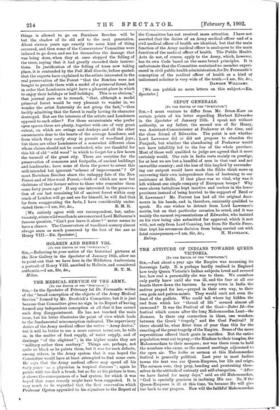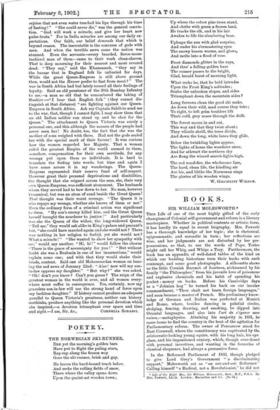THE ATTITUDE OF INDIANS TOWARDS QUEEN VICTORIA.
[TO THE EDITOR OF THE "SPECTATOR.")
SIE,—Just about a year ago the Empire was mourning RS Sovereign Lady. It is perhaps hardly realised in England how truly Queen Victoria's Indian subjects loved and revered her, how real a personality she was to them. We ourselves only partly knew until she was ill, and the fear at all our hearts threw down the barriers. In every town in India the natives prayed for her,—prayed in their own way, to their own gods and patron-saints. They would omit not even the least of the godlets. Who could tell where lay hidden the reel from which her "thread of life" seemed almost all unwound? It was the Festival of the Goat—Babri Id—the festival which comes after the long Mahommedan Lent—the Ramz,an. Is there any connection in ideas, one wonders, between the Greek "tragedy" and the Goat Festival? If there should be, what fitter time of year than this for the enacting of the great tragedy of the Empire. Some of the more superstitious offered black goats in sacrifice. But the entire population went out to pray,—the Hindoos to their temples, the Mahommedans to their mosques; nor was there room to hold the numbers who came, so the massed meetings adjourned to the open air. The kutba or sermon at this Mahommedan festival is generally political. Last year in most Indian towns the text was our Queen-Empress, her life and reign, The sermon over, they pray, bending and prostrating them- selves in the attitude of entreaty and self-abnegation. "After we have fasted for many days," said an old Mahommedan, "God is specially gracious in inclining His ear. So, if the Queen-Empress is ill at this time, 'tis because He will give her back to our prayers. Now will the faithful Mahommedan
rejoice that not even water touched his lips through his time of fasting ! " "She could never die," was the general convic- tion. "God will work a miracle, and give her heart new pulse-beats." For in India miracles are among our daily ex- pectations. Our faith, our belief demands that which is beyond reason. The inscrutable is the converse of gods with men. And when the terrible news came the nation was stunned. Even the servants—every bearded, fierce-mous- tachioed man of them—came to their work clean-shaven. That is deep mourning for their nearest and most revered dead. "They say," said the Khansamah, "they say in the bazaar that in England folk lie unburied for days. While the great Queen-Empress is still above ground then, would not the Hazoor prefer to fast from meat ? " The war in South Africa had but lately roused all their feelings of loyalty. Said an old pensioner of the 20th Bombay Infantry to me,—a man so old that he remembered the taking of Bushire :—" I hear that English folk" ( they cannot dis- tinguish at that distance) "are fighting against our Queen- Empress in South Africa. Ask my Captain Sahib to send me to the war, that, though I cannot fight, I may show them that an old Indian soldier can stand up and be shot for the Queen." The attachment to Queen Victoria was surely a personal one, and this although the masses of the people had never seen her! No doubt, too, the fact that she was the mother of sons weighed with them. Had not the gods sealed her with the special mark of their favour ! It was curious how the women regarded her Majesty. That a woman ruled the greatest Empire of the world seemed to them, somehow, compensation for their own servitude, for any wrongs put upon them as individuals. It is hard to translate the feeling into words, but time and again I have come across it in my wanderings. The Queen. Empressrepresented their reserve fund of self-respect. However great their personal deprivations and disabilities, he thought that she reigned across the seas, she, their very own Queen-Empress, was sufficient atonement. The husbands whom they served had to bow down to her. No man, however tyrannical, but was an atom of sand beside the Great Queen! q'hat thought was their worst revenge. "The Queen it is who repays my wrongs, whether she knows of them or not." Even the ordinary form of a criminal action was significant to them, "My son's enemy killed him, and the Great Queen herself brought the murderer to justice !" And particularly -was she the Queen of the widow, the long-widowed Queen. " Tell me," they would ask alike in King's palace and peasant's hut, "she could have married again and she would not ? There was nothing in her religion to forbid, yet she would not ? What a miracle ! " "She wanted to show her sympathy with me," would say another. "Hi, hi !" would follow the chorus There is the grace of sovereignty for you!" "But without ioubt she was a Brahmin in one of her incarnations," would explain some one; and with that they would shake their heads, content. Said one old Mahommedan woman on hear- ing the sad news of January 22nd " Alas now will my son- in-law oppress my daughter." "But why ? " she was asked. "' Oh ! don't you know ? Can't you guess ? The reign of the greatest woman in the world is over, and all women every- where must suffer in consequence. Yes, certainly, now my graceless son-in-law will use the strong hand of force upon my luckless daughter." If history cannot produce an adequate parallel to Queen Victoria's greatness, neither can history 'methinks, produce anything like the personal devotion which she inspired,—a devotion triumphant over space and time











































 Previous page
Previous page